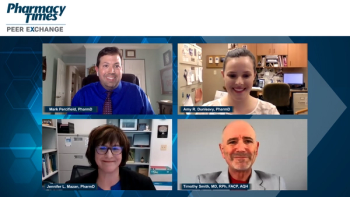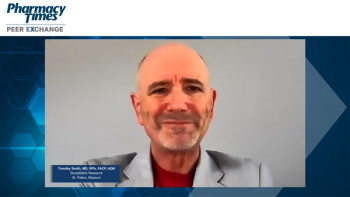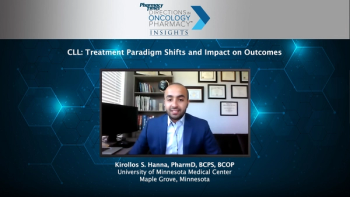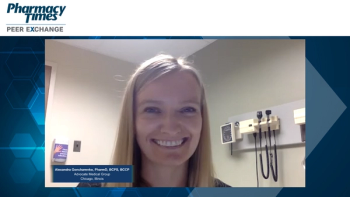
Panzyga is indicated for the treatment of primary humoral immunodeficiency, chronic inflammatory demyelinating polyneuropathy, and chronic immune thrombocytopenia.

Panzyga is indicated for the treatment of primary humoral immunodeficiency, chronic inflammatory demyelinating polyneuropathy, and chronic immune thrombocytopenia.

Mikhail Kosiborod, MD, cardiologist and vice president of research at Saint Luke's Health in Kansas City, discussed the findings around the safety profile of dapagliflozin in patients with and without type 2 diabetes hospitalized with COVID-19 during the DARE-19 trial.

Milind Javle, PhD, professor of Gastrointestinal Medical Oncology at the University of Texas MD Anderson Cancer Center, discusses the eligibility requirements for patients included in the phase 2 trial results that led to the FDA approval of infigratinib.

Michael Radin, MD, executive director, Diabetes Cardio Renal Medical Director Team, Medical Affairs, Novo Nordisk, discusses the adverse events experienced by patients during the SUSTAIN FORTE phase 3 clinical trial evaluating an investigational 2 mg dose of semaglutide injection in adults with type 2 diabetes.

Sacituzumab govitecan is approved for the treatment of patients with unresectable locally advanced or metastatic triple-negative breast cancer who have received 2 more prior systemic therapies.

Mikhail Kosiborod, MD, cardiologist and vice president of research at Saint Luke's Health in Kansas City, discussed the findings around the efficacy of dapagliflozin in the DARE-19 trial assessing its efficacy and safety in patients with type 2 diabetes hospitalized with COVID-19.

Michael Radin, MD, executive director, Diabetes Cardio Renal Medical Director Team, Medical Affairs, Novo Nordisk, discusses how the SUSTAIN FORTE phase 3 clinical trial evaluating an investigational 2 mg dose of semaglutide injection in adults with type 2 diabetes was conducted.

Milind Javle, PhD, professor of Gastrointestinal Medical Oncology at the University of Texas MD Anderson Cancer Center, discussed the findings of the phase 2 trial assessing infigratinib for treatment of previously treated locally advanced or metastatic cholangiocarcinoma harboring an FGFR2 fusion or rearrangement.

Special considerations for counseling patients and prescribing lasmiditan, a targeted 5-HT1F therapy approved as acute migraine treatment.

Timothy Smith, MD, RPh, FACP, AQH, describes goals of therapy for the acute treatment of migraine and reacts to current treatment limitations associated with available drug therapies.

Lactitol (Pizensy) is an oral solution for treating chronic idiopathic constipation in adults.

Kirollos Hanna, PharmD, BCPS, BCOP, assistant professor of pharmacy at the Mayo Clinic College of Medicine and the oncology pharmacy manager at M Health Fairview - Maple Grove, discusses the potential impact of ACCC's Multiple Myeloma Dispensing Project on the field.

Michael Radin, MD, executive director, Diabetes Cardio Renal Medical Director Team, Medical Affairs, Novo Nordisk, discusses the findings around the efficacy and safety of the 2 mg dose of semaglutide for the treatment of type 2 diabetes.

Chad Landmon, attorney and chair of Axinn’s Intellectual Property and FDA Practice Groups, discusses upcoming clinical trials on COVID-19 booster shots, the possibility of cancer vaccines, and the future of pharmaceuticals and FDA approvals.

Kirollos S. Hanna, PharmD, BCPS, BCOP, provides an overview of the shifts in treatments, trends, and outcomes seen over the past decade in CLL.

Umbralisib was granted accelerated approval by the FDA for the treatment of select patients with relapsed/refractory marginal zone lymphoma and relapsed/refractory follicular lymphoma.

Edwin Gump, PhD, vice president of the Small Molecules Department at US Pharmacopeia (USP), discusses USP’s reference standards that support the analysis and monitoring of nitrosamine impurities in the drug supply chain.

Pharmacy Times spoke with Chad Landmon, attorney and chair of Axinn’s Intellectual Property and FDA Practice Groups, about key events in the FDA pipeline, such as Emergency Use Authorizations during COVID-19 and the future of narrowed approvals.

Alexandra Goncharenko, PharmD, BCPS, BCCP reviews factors that may influence treatment approaches for heart failure and emphasizes the importance of diagnosis to begin maximally tolerated doses of guideline-directed medical therapy.

Trilaciclib (Cosela) is indicated to reduce the frequency of chemotherapy-induced bone marrow suppression in adults receiving certain types of chemotherapy for extensive-stage small cell lung cancer.

Robert Sidonio, Jr., MD, MSc, discusses treatment considerations and ideal candidates for factor VIII and emicizumab in patients with hemophilia A.

A panel of experts review the goals of prophylactic therapy as well as prophylactic therapy options for patients with hemophilia A.

Ryan Jacobsen, PharmD, BCPS leads a discussion on defining heart failure with preserved ejection fraction (HFpEF) and heart failure with reduced ejection fraction (HFrEF) as well as the importance of staging and functional classification criteria.

June 27 is National HIV Testing Day, so Pharmacy Times interviewed Warren O, a person living with HIV for 11 years who has first-hand experience with HIV stigma, on his perspective on the critical role of testing all sexually active individuals who may be at risk for HIV.

Azacitidine (Onureg) was approved by the FDA in September 2020 as a maintenance therapy for acute myeloid leukemia.

Amy R. Dunleavy, PharmD, highlights various drug therapies used for the acute treatment of migraine and provides recommendations for appropriate use.

A panel discussion regarding the underdiagnosis and burden of migraine attacks on patients and the rationale for educating the community about signs and symptoms.

Bia Labate, PhD, public education and culture specialist at the Multidisciplinary Association for Psychedelic Studies, and Kelan Thomas, PharmD, MS, associate professor of clinical sciences at Touro University California College of Pharmacy, discuss the psychedelic medicine market and the outlook for the field.

Key opinion leaders discuss the factors in giving patients with hemophilia A prophylaxis, including any barriers and discussions with the patient.

Alexis Kuhn, PharmD, BCOP, explains the benefits, risks, and potential barriers associated with prophylactic therapy for patients with hemophilia A.